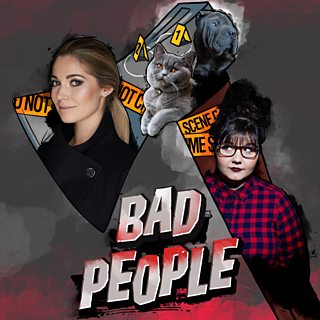How a serial killer inspired a feminist movement
In November 2020, the man known as the Yorkshire Ripper, Peter Sutcliffe, at the age of 74. The chairman of the West Yorkshire Police Federation responded to this news with a public statement; “On hearing of the death of Peter Sutcliffe today, I feel: good riddance.” He continued, “The monster who murdered so many innocent women in and around West Yorkshire should rot in hell.”
On the most recent episode of Bad People on Βι¶ΉΤΌΕΔ Sounds we try to understand the murders of the Yorkshire Ripper, and how this case sparked a feminist movement.
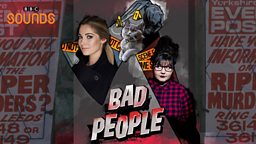
Loose morals
Most people remember the Peter Sutcliffe (who later changed his name to Peter Coonan), for committing a series of gruesome murders in the 1970s.
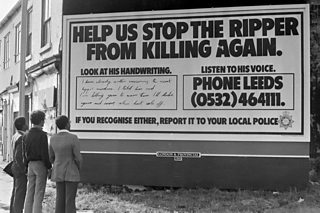
If you believe that this is the whole story, then perhaps you haven’t met women."
The 1981 , which was the product of an inquiry into the Ripper police investigation, described the “standard Ripper trademark”, where Sutcliffe would hit his victims in the head with a hammer, stab them, and then leave part of the victim’s body naked and on display in a public space.
The killings were a brutal display of a hatred of women which left a deep impression on the nation. After five long years at large, at his trial Sutcliffe received 20 life sentences for killing 13 women and attempting to kill seven more.
Initially his actions were thought to be limited to women who were, according to the Byford report, “prostitutes or women of loose morals”. Later, the police reluctantly abandoned this belief when women whom they believed to be “innocent” were also murdered.
The press coverage, and the language used in the police reports around this time, showcase deeply troubling ideas regarding the kinds of lives that society values protecting.
The folklore goes that while the Yorkshire Ripper was terrorising the neighbourhood, women were terrified of going out. Meanwhile, the police were bravely on their manhunt. But, if you believe that this is the whole story, then perhaps you haven’t met women.
Reclaiming the night
After two years of killings the police still hadn’t caught him and women were exhausted of the national press coverage of their slain sisters. Then, rather than protecting women, police effectively gave women a curfew - they were told to stay out of public spaces after dark.
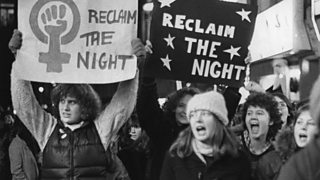
71% of women of all ages in the UK have experienced some form of sexual harassment in a public space."
This is when women reached a breaking point, and a feminist movement was born.
On the 12th of November 1977 hundreds of women bundled up in jackets and woolly hats and took to the streets to participate in the first “” march.
They were an impressive sight, with fire-lit torches and signs painted with statements like “No curfew on women - curfew on men”, and “women are angry that men force us to have to stay at home”.
The march was organised by several groups that were upset by the sensationalising of the Yorkshire Ripper’s murders which overshadowed the bigger societal problem of male violence towards women.
The same march is still held annually today, 40 years after its debut, and unfortunately it continues to be necessary. published a report in 2021 on the prevalence and reporting of sexual harassment in UK public spaces. One of the key findings that they extrapolated from their sample was that that 71% of women of all ages in the UK have experienced some form of sexual harassment in a public space.
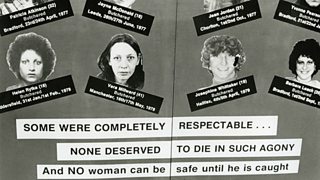
The most common types of sexual harassment in public were being cat called, being stared at, unwelcome touching or groping, in-person comments or jokes, unwelcome sexual advances or requests for sexual favours, being followed, and indecent exposure. Most women reporting experiencing all or most of these.
Shockingly, 20% of women also said they had been forced to participate in sexual behaviour in public. As Reclaim the Night write on their own website - “women should be able to walk anywhere and that they should not be blamed or restricted because of men’s violence.” The fight for women’s safe freedom of movement continues.
There is something beautiful about the fact that this movement of resistance has outlived the serial killer whose crimes inspired it.
Learn more about this case, including the fraudster who derailed the investigation for years, and how it led to major changes in police investigations in England on Episode 38 of Bad People on Βι¶ΉΤΌΕΔ Sounds hosted by me, a criminal psychologist, and my co-host, comedian Sofie Hagen.

Bio
Dr Julia Shaw is a research associate at University College London and the co-host of the Bad People podcast on Βι¶ΉΤΌΕΔ sounds.
She is an expert on criminal psychology, and the author of two books “Making Evil: The Science Behind Humanity’s Dark Side” and “The Memory Illusion: Remembering, Forgetting, and the Science of False Memory.
Her website: , and twitter
